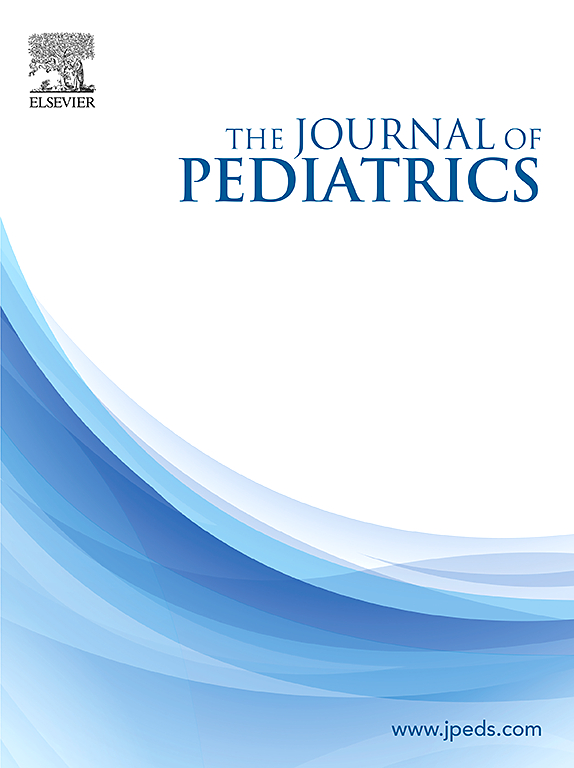Resilience in Young Adults with Congenital Heart Disease in Relation to Neurodevelopment in the Preschool Period
IF 3.5
2区 医学
Q1 PEDIATRICS
引用次数: 0
Abstract
Objective
To determine if resilience among young adults with congenital heart disease is associated with patient characteristics and neurobehavioral status during the preschool period.
Study design
This study is a prospective, cross-sectional analysis of young adults enrolled in a longitudinal study of neurodevelopmental outcomes in congenital heart disease. All subjects underwent surgery with cardiopulmonary bypass at age ≤6 months of life. Resilience and general health status were evaluated using standardized questionnaires (RS-14 and SF-36, respectively). The relationships between resilience and patient and management factors as well as neurobehavioral status in the preschool period were examined.
Results
The RS-14 and SF-36 were completed by 200 subjects (average age 20.1, IQR 19.2, 21.3 years). Median resilience score was 81.0 (CL0.95 78, 82), higher than the population average of 76.0 (P = .014). Higher resilience scores were correlated with higher health-related quality of life scores (r = 0.506, P < .001). Better executive function (P = .032) and social skills (P = .004) at the 4-year evaluation were associated with higher resilience in young adulthood. Inattention (P = .015) and pervasive development problems (P = .020) were inversely associated with resilience. No demographic, patient-related, or operative management factors were associated with higher or lower resilience (all P > .223).
Conclusions
Findings reported here show an association between preschool neurobehavioral status, overall health-related quality of life, and resilience in young adulthood. Identification of an at-risk population may provide an opportunity for intervention early in life, leading to improved psychosocial development with increased resilience.
青少年先天性心脏病患者的恢复力与学龄前神经发育的关系
目的:探讨青少年先天性心脏病(CHD)患者的适应力是否与学龄前患者特征和神经行为状态有关。研究设计:本研究是一项前瞻性横断面分析,研究对象为参加冠心病神经发育结果纵向研究的年轻人。所有受试者在年龄≤6个月时接受CPB(体外循环)手术。采用标准化问卷(RS-14和SF-36)评估恢复力和一般健康状况。研究了学龄前儿童心理弹性与患者、管理因素及神经行为状态的关系。结果:共完成RS-14和SF-36量表200例,平均年龄20.1岁,IQR 19.2岁,21.3岁。韧性中位数得分为81.0 (CL0.95 78,82),高于群体平均得分76.0 (p = 0.014)。较高的弹性评分与较高的健康相关生活质量(HRQOL)评分相关(r = 0.506, p < 0.001)。在4年评估中,较好的执行功能(p = 0.032)和社交技能(p = 0.004)与青年期较高的心理弹性相关。注意力不集中(p = 0.015)和普遍发展问题(p = 0.020)与弹性呈负相关。没有人口统计学、患者相关或手术管理因素与恢复力的高低相关(均p < 0.223)。结论:本文报道的研究结果表明,学龄前神经行为状态、总体HRQOL和成年后的恢复力之间存在关联。识别高危人群可能为生命早期干预提供机会,从而改善心理社会发展,增强适应力。
本文章由计算机程序翻译,如有差异,请以英文原文为准。
求助全文
约1分钟内获得全文
求助全文
来源期刊

Journal of Pediatrics
医学-小儿科
CiteScore
6.00
自引率
2.00%
发文量
696
审稿时长
31 days
期刊介绍:
The Journal of Pediatrics is an international peer-reviewed journal that advances pediatric research and serves as a practical guide for pediatricians who manage health and diagnose and treat disorders in infants, children, and adolescents. The Journal publishes original work based on standards of excellence and expert review. The Journal seeks to publish high quality original articles that are immediately applicable to practice (basic science, translational research, evidence-based medicine), brief clinical and laboratory case reports, medical progress, expert commentary, grand rounds, insightful editorials, “classic” physical examinations, and novel insights into clinical and academic pediatric medicine related to every aspect of child health. Published monthly since 1932, The Journal of Pediatrics continues to promote the latest developments in pediatric medicine, child health, policy, and advocacy.
Topics covered in The Journal of Pediatrics include, but are not limited to:
General Pediatrics
Pediatric Subspecialties
Adolescent Medicine
Allergy and Immunology
Cardiology
Critical Care Medicine
Developmental-Behavioral Medicine
Endocrinology
Gastroenterology
Hematology-Oncology
Infectious Diseases
Neonatal-Perinatal Medicine
Nephrology
Neurology
Emergency Medicine
Pulmonology
Rheumatology
Genetics
Ethics
Health Service Research
Pediatric Hospitalist Medicine.
 求助内容:
求助内容: 应助结果提醒方式:
应助结果提醒方式:


